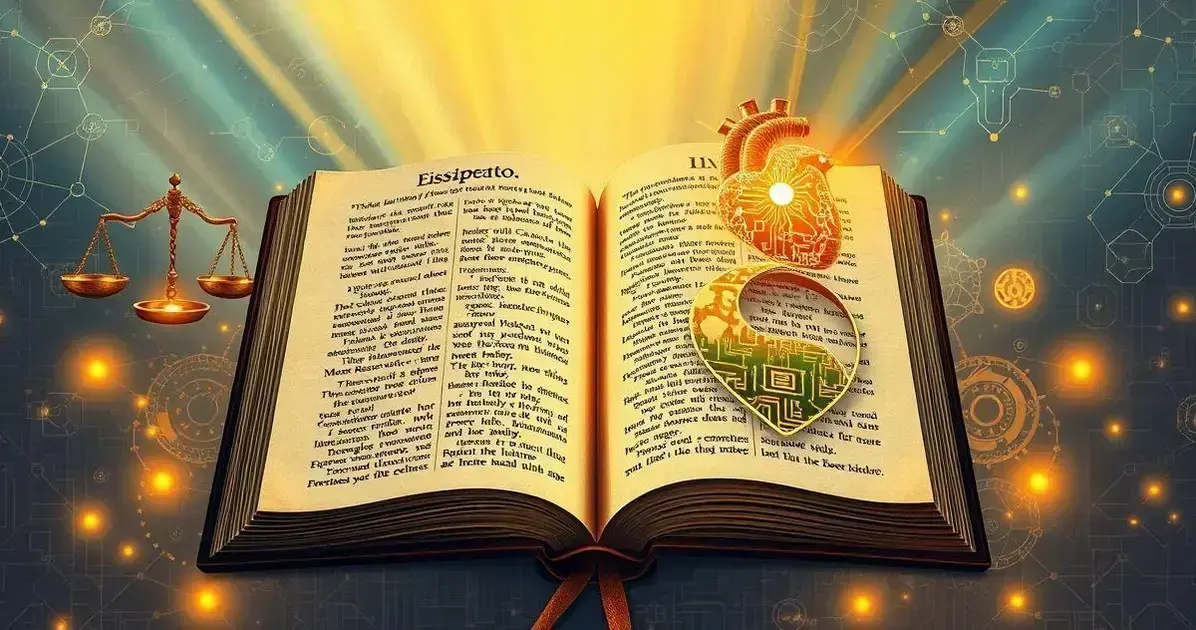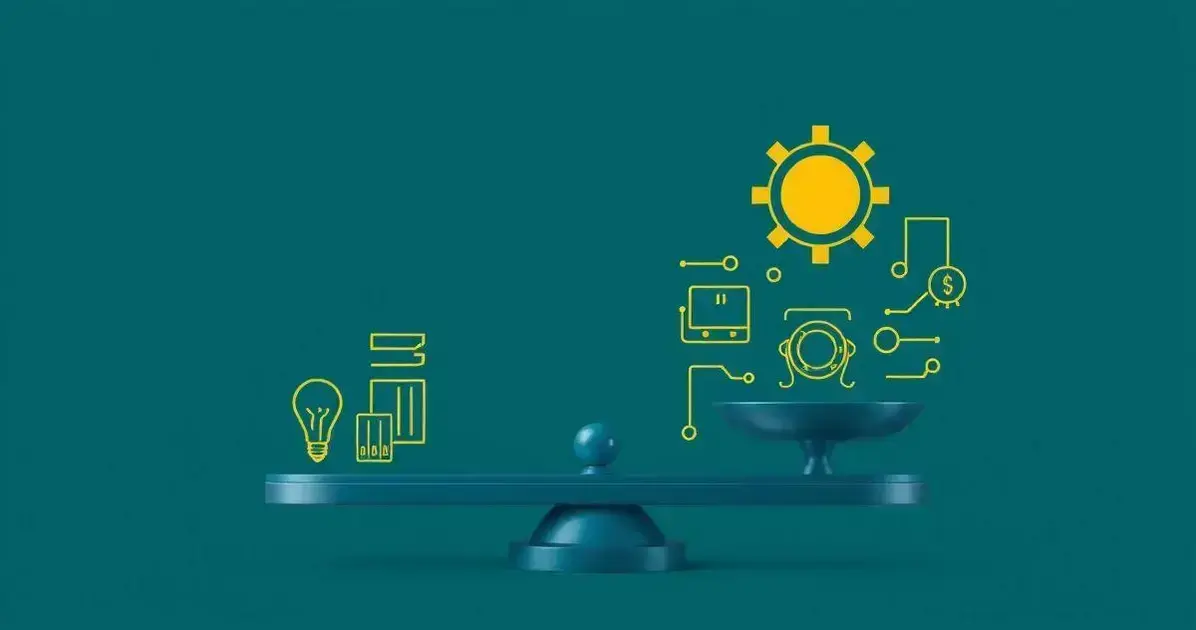In today’s rapidly evolving world, the question arises: what does the Bible say about artificial intelligence?
As technology advances, many seek to understand how ancient scriptures relate to modern innovations.
This article delves into biblical perspectives, ethics, and the intersections of faith and technology.
Biblical Perspectives on Technology
Throughout history, technology has been a tool for humanity. The Bible often addresses the intersection of human innovation and divine guidance. In Genesis, we see the creation of the universe, demonstrating God’s role as the ultimate creator.
This sets a precedent for technology as an extension of human creativity, reflecting God’s image.
The Tower of Babel as a Warning
In the story of the Tower of Babel, humanity attempts to build a tower to reach the heavens. This story highlights the dangers of pride and the potential misuse of technology. God confuses their language to prevent them from accomplishing their goal.
This illustrates that while technology can unite people, it must be approached with humility and respect for God’s authority.
Wisdom in Creation
The biblical book of Proverbs emphasizes the value of wisdom. Proverbs 2:6 states, “For the Lord gives wisdom; from His mouth come knowledge and understanding.” This encourages us to seek divine wisdom in developing and utilizing technology. By doing so, we can ensure that our innovations align with God’s will.
Ethical Use of Technology
The Bible lays down ethical guidelines that inform how we use technology. The commandment, “You shall not bear false witness” (Exodus 20:16) resonates even in our digital age, reminding us to use technology transparently and truthfully. As technology advances, we must remain vigilant about our moral obligations.
The question arises: how can we apply these biblical principles to modern technology? It requires us to reflect on our intentions, ensuring that our innovations serve humanity and honor God.
Ancient Wisdom in Modern Context
Ancient wisdom can play a vital role in understanding modern challenges posed by technology. The teachings found in the Bible provide valuable insights that can guide us today. For instance, in Ecclesiastes 1:9, it says, “What has been will be again, what has been done will be done again; there is nothing new under the sun.” This reflects the idea that while technology evolves, human challenges remain largely the same.
Insights from Proverbs and Technology
The Book of Proverbs offers nuggets of wisdom that are applicable to our technological age. Proverbs 4:7 states, “Wisdom is the principal thing; therefore get wisdom.” In the context of technology, this serves as a reminder to pursue knowledge and understanding, ensuring that we apply our innovations wisely.
Learning from Historical Contexts
Historical societies faced their own technological developments, from the invention of the wheel to the printing press. These transformations altered culture and communication significantly. Understanding the impact of these inventions helps us recognize that every technology has its consequences, both positive and negative.
Spiritual Guidance Amidst Innovation
As we develop and integrate AI and other technologies, the biblical call for discernment is crucial. James 1:5 teaches us to ask God for wisdom when we lack it. This request becomes even more significant as we grapple with ethical dilemmas posed by advancements in AI and automation.
By applying these ancient insights to our modern context, we can navigate the evolution of technology with a balanced perspective, rooted in faith and wisdom.
Ethics of Artificial Intelligence in Scripture

The ethics of artificial intelligence is a pressing issue today, and it resonates with guidance found in Scripture. The Bible provides principles that can help navigate these modern dilemmas. For instance, the commandment to love one’s neighbor (Mark 12:31) stands as a foundation for ethical considerations in AI development and implementation.
Value of Human Life
In Genesis 1:27, it states, “So God created mankind in his own image.” This signifies the inherent value of every human life. When developing AI systems, we must respect and uphold human dignity, ensuring our technologies do not devalue human experiences. AI should aim to enhance human lives, not replace or diminish them.
The Principle of Stewardship
God calls humanity to be stewards of creation (Genesis 2:15). This principle extends to technology as well. As we create AI, we must manage it responsibly and ethically, considering the long-term impact on our world and society.
Transparency and Honesty
Proverbs 11:3 says, “The integrity of the upright guides them, but the crookedness of the treacherous destroys them.” Applying this principle in AI means that we should be transparent about how these technologies work and the data they use. Users deserve to know how AI operates, ensuring trust and accountability.
In conclusion, these biblical principles serve as a framework for guiding the ethical development and use of artificial intelligence. By aligning AI practices with scriptural ethics, we can create technologies that honor God and benefit humanity.
Creation and the Role of Humanity
In the biblical narrative, the account of creation highlights the special role of humanity. Genesis 1:26 states that God created mankind in His own image. This unique aspect sets humans apart, granting them a critical role as caretakers of creation.
The Charge to Steward Creation
In Genesis 2:15, God commands Adam to “tend and keep” the Garden of Eden. This verse signifies humanity’s responsibility to care for the environment and all living beings. As creators of technology, we have a similar duty to ensure that its development does not harm creation.
Humans as Innovators
Throughout history, humans have used their creativity and intelligence to innovate. In the context of AI, this ability reflects God’s creative nature. However, it is vital that such innovations align with ethical standards and promote the greater good.
Balancing Technology and Humanity
While technology can enhance human life, it is essential to maintain the balance between innovation and humanity. Humans should be at the center of technological advancement, ensuring that tools serve to elevate human dignity. The Bible encourages us to remember that our actions impact ourselves and others.
As stewards of creation and innovators, humanity’s role is to ensure that our use of technology, especially AI, reflects the care and respect that God commands in creation.
AI and Free Will: A Biblical Examination
The concept of free will is foundational to human experience and is deeply explored in the Bible. In Genesis, God gives Adam and Eve the choice to obey or disobey Him, demonstrating the gift of free will. This choice reflects God’s desire for genuine relationships based on love and trust, rather than forced compliance.
Choice and Consequences
When Adam and Eve ate from the Tree of Knowledge, they exercised their free will. This decision led to significant consequences, marking humanity’s fall into sin. It highlights how choices shape our lives, reminding us of the importance of using free will wisely.
AI and Decision-Making
As artificial intelligence evolves, it is critical to consider how these systems make decisions. Unlike humans, AI operates based on algorithms and data, lacking the ability to choose ethically. This raises questions about accountability and the implications of relying on machines that can’t exert free will.
God’s Sovereignty and Human Freedom
In the Bible, God’s sovereignty coexists with human free will. Romans 8:28 conveys that God works for the good of those who love Him, implying He is in control despite human choices. This suggests that while humans have freedom, God’s plan ultimately prevails.
The relationship between AI and free will necessitates careful consideration. As we integrate AI into our lives, we should reflect on the ethical implications of its decision-making capabilities and how they might influence human freedom.
Moral Responsibilities in a Tech-Driven World

In a tech-driven world, humanity faces significant moral responsibilities. As technology permeates every aspect of life, understanding these responsibilities becomes increasingly important. The Bible provides guiding principles that can help us navigate ethical dilemmas in our use of technology.
Accountability for Choices
Each individual is responsible for their actions, as reflected in Romans 14:12, which states, “So then, each of us will give an account of ourselves to God.” In the context of technology, this accountability extends to how we use AI and digital tools. Decisions made in the tech realm should align with values that respect human dignity and promote truthfulness.
Impact on Society
Technology shapes society, influencing behaviors and communication. As stewards of technology, we must consider the societal effects of our innovations and choices. Are we building tools that improve lives or create division? Philippians 2:4 encourages us to look not only to our interests but also to the interests of others.
Ethical Use of AI
With the rise of AI, ethical considerations are paramount. We must ensure that AI is designed and implemented with fairness, transparency, and respect for privacy. Proverbs 11:1 teaches that dishonest scales are an abomination to the Lord, emphasizing the need for integrity in how technology is applied.
As we navigate this tech-driven landscape, we are called to reflect on our moral responsibilities. By applying biblical principles, we can ensure that our technological advancements contribute positively to humanity.
Prophecy and Future Technologies
Prophecy in scripture often hints at future events and changes. As we think about future technologies, biblical prophecies can provide unique insights. For example, the book of Daniel speaks of knowledge increasing in the last days (Daniel 12:4). This can relate to the rapid advancements we see in technology today.
Technology as a Tool for Fulfillment
Many believe that technology will play a key role in fulfilling biblical prophecy. For instance, advancements in communication technology allow the message of the Gospel to reach every corner of the Earth. This aligns with Matthew 24:14, which states that the gospel will be preached to all nations before the end comes.
Ethical Considerations in Future Innovations
As we develop new technologies, we must remember the ethical implications. Scripture calls us to act justly, love mercy, and walk humbly with God (Micah 6:8). This principle guides how we approach the creation and deployment of technology, ensuring it benefits humanity.
Signs of the Times
Many prophecies outline events that may correspond with our current technological landscape. For example, the rise of global connectivity and the use of AI can bring both opportunity and challenges. We must remain vigilant, analyzing how these advancements align with prophetic teachings.
In considering prophecy and future technologies, it is important to maintain a biblical perspective, aligning our innovations with the principles found in Scripture.
God’s Sovereignty over Human Innovation
God’s sovereignty plays a crucial role in understanding human innovation. The Bible affirms that God is in ultimate control of all creation, including our technological advancements. In Isaiah 46:10, it states, “My purpose will stand, and I will do all that I please.” This assures us that human efforts are ultimately guided by divine will.
Humanity’s Role as Creators
Humans are made in God’s image, which equips us with creativity and the ability to innovate. As seen in Genesis 1:28, God commands us to fill the earth and subdue it, indicating a partnership in creation. Our innovations can reflect God’s wisdom and goodness when used to serve others.
God’s Guidance in Technology
In our pursuit of technological advancement, we must seek God’s guidance. Proverbs 3:5-6 instructs us to trust in the Lord with all our hearts and acknowledge Him in all our ways. This means inviting God into our decision-making processes concerning innovation and technology.
Ethical Innovation Under Divine Authority
As we create and adopt new technologies, we are called to act ethically. James 1:5 encourages us to ask God for wisdom when faced with complex issues. It is essential to align our innovations with God’s moral teachings to honor His sovereignty and promote human flourishing.
By recognizing God’s sovereignty over human innovation, we can approach technological advancements with humility, integrating faith into our creative process and remaining mindful of the impact our innovations have on the world.
Case Studies: AI Applications through a Biblical Lens

Examining AI applications through a biblical lens reveals insightful examples of how technology can align with ethical principles. One important case study involves the use of AI in healthcare to improve patient outcomes. For instance, AI algorithms can analyze vast amounts of medical data, leading to more accurate diagnoses.
Healthcare Innovations
In many hospitals, AI systems assist doctors by providing real-time insights based on patient data. This reflects the biblical value of caring for the sick, as seen in Matthew 25:36, where Jesus says, “I was sick, and you visited me.” By using technology responsibly, healthcare professionals can fulfill their calling to care for others.
Environmental Monitoring
Another case study involves AI applications in environmental protection. AI tools can monitor pollution levels and predict natural disasters. In Genesis 2:15, God commands humanity to care for the Earth, reminding us of our stewardship role. Technologies that safeguard the environment align with this biblical mandate.
Community Support
AI is also being utilized in community support systems. For example, chatbots provide assistance for mental health services, offering guidance to individuals in distress. This aligns with Galatians 6:2, which encourages us to bear one another’s burdens. By leveraging AI for support, we can help those in desperate need.
These case studies illustrate that when aligned with biblical values, AI can be a powerful tool for positive change. By integrating faith with technology, we can ensure that our innovations serve the greater good and reflect God’s love.
What Does the Bible say About Artificial Intelligence? Final Considerations
The exploration of artificial intelligence through a biblical lens shows the profound connection between faith and innovation. Understanding God’s sovereignty over human innovation inspires us to create responsibly and ethically.
As we witness AI’s advancements across various fields, from healthcare to environmental protection, we must align our practices with biblical values. The principles found in Scripture encourage us to utilize technology for the greater good, fostering community support, environmental stewardship, and healthcare improvements.
By integrating biblical perspectives and ethical considerations into our technological endeavors, we can ensure that AI serves humanity and reflects God’s love in our world. Let us embrace these innovations as opportunities to share hope, compassion, and wisdom in an increasingly tech-driven society.